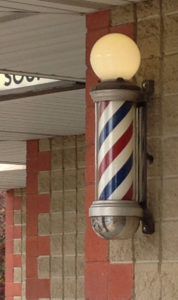 Palisades Park police recently charged a New Jersey barber with Unlicensed Practice of Medicine, N.J.S.A. 2c:21-20, per the news. Indeed, the North Jersey barbershop owner allegedly performed unlicensed laser surgery on a woman. To illustrate, the investigation began when the woman complained to local police. Additionally, authorities allege the procedure left her badly injured. Furthermore, the cops claim the barber’s botched laser treatment caused injuries, including scars, to the woman’s face and chin in November 2017. Moreover, authorities allege the barber was not a doctor and not licensed to provide the treatment. Consequently, the Bergen County Prosecutor’s Office said he will face a charge for aggravated assault, pursuant to N.J.S.A. 2c:12-1. In addition, they say he will face a charge for unlicensed practice of medicine and surgery, pursuant to N.J.S.A. 2c:21-20.
Palisades Park police recently charged a New Jersey barber with Unlicensed Practice of Medicine, N.J.S.A. 2c:21-20, per the news. Indeed, the North Jersey barbershop owner allegedly performed unlicensed laser surgery on a woman. To illustrate, the investigation began when the woman complained to local police. Additionally, authorities allege the procedure left her badly injured. Furthermore, the cops claim the barber’s botched laser treatment caused injuries, including scars, to the woman’s face and chin in November 2017. Moreover, authorities allege the barber was not a doctor and not licensed to provide the treatment. Consequently, the Bergen County Prosecutor’s Office said he will face a charge for aggravated assault, pursuant to N.J.S.A. 2c:12-1. In addition, they say he will face a charge for unlicensed practice of medicine and surgery, pursuant to N.J.S.A. 2c:21-20.
Unlicensed practice of medicine, N.J.S.A. 2c:21-20
Legislation
A person commits a crime of the third degree if he knowingly does not possess a license or permit to practice medicine and surgery or podiatric medicine, or knowingly has had the license or permit suspended, revoked or otherwise limited by an order entered by the State Board of Medical Examiners, and he:
- engages in that practice;
- exceeds the scope of practice permitted by the board order;
- holds himself out to the public or any person as being eligible to engage in that practice;
- engages in any activity for which such license or permit is a necessary prerequisite, including, but not limited to, the ordering of controlled dangerous substances or prescription legend drugs from a distributor or manufacturer; or
- practices medicine or surgery or podiatric medicine under a false or assumed name or falsely impersonates another person licensed by the board.
Adjudication
In order to convict a defendant of unlicensed practice of medicine, under N.J.S.A. 2c:21-20, the State must present evidence to prove two elements. To illustrate, the State must prove beyond a reasonable doubt that the defendant knowingly did not possess a license or permit to practice medicine and surgery or podiatry. Alternatively, the State must prove beyond a reasonable doubt that the defendant knowingly has had the license or permit suspended, revoked or otherwise limited by an order entered by the State Board of Medical Examiners. Additionally, the State must prove beyond a reasonable doubt that the defendant knowingly:
- engaged in the practice of medicine and surgery or podiatry;
- exceeded the scope of practice permitted by the board order;
- held himself/herself out to the public or any person as being eligible to engage in that practice;
- engaged in any activity for which such license or permit is a necessary prerequisite; or
- practiced medicine or surgery under a false or assumed name, or falsely impersonated another person licensed by the Board.
Follow